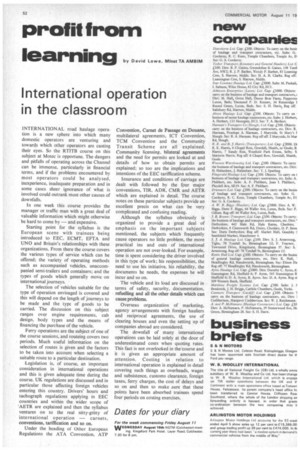profit from
Page 54

If you've noticed an error in this article please click here to report it so we can fix it.
learning by David Lowe, MInst TA AMBIM
International operation in the classroom
INTERNATIONAL road haulage operation is a new sphere into which many domestic operators are venturing and towards which other operators are casting their eyes. So the RTITB course on this subject at Motec is opportune. The dangers and pitfalls of operating across the Channel can be immense, particularly in financial terms, and if the problems encountered by most operators could be analysed, inexperience, inadequate preparation and in some cases sheer ignorance of what is involved could outrank most other causes of downfalls.
In one week this course provides the manager or traffic man with a great deal of valuable information which might otherwise be hard to come by — and expensive.
Starting point for the syllabus is the European scene with trainees being introduced to EEC, ECMT, EFTA and UNO and Britain's relationships with these organizations. From there the course covers the various types of service which can be offered; the variety of operating methods such as accompanied vehicles, unaccompanied semi-trailers and containers; and the types of goods which generally move on international journeys.
The selection of vehicles suitable for the type of operation envisaged is covered and this will depend on the length of journeys to be made and the type of goods to be carried. The discussion on this subject ranges over engine requirements, cab design, body types and the means of financing the purchase of the vehicle.
Ferry operations are the subject of one of the course sessions, and routeing covers two periods. Much useful information on the selection of routes is given and the factors to be taken into account when selecting a suitable route to a particular destination.
Legislation is, of course, an important consideration in international operations and this is given adequate time during the course. UK regulations are discussed and in particular those affecting foreign vehicles entering this country. Drivers' hours and tachograph regulations applying in EEC countries and within the wider scope of 'AETR are explained and then the syllabus ventures on to the real nitty-gritty of international operation — carnets, conventions, tariffication and so on.
Under the heading of Other European Regulations the ATA Convention, ATP Convention, Carnet de Passage en Douane, multilateral agreements, ICT Convention, TCM Convention and the Community Transit Scheme are all explained. Community licensing, bilateral agreements and the need for permits are looked at and details of how to obtain permits are explained; so too are the implications and intentions of the EEC tariffication scheme.
Insurance and conditions of carriage are dealt with followed by the four major 'conventions, TIR, ADR, CMR and AETR which are explained in detail. The course notes on these particular subjects provide an excellent precis on what can be very complicated and confusing reading.
Although the syllabus obviously is organized to provide a great deal of emphasis on the important subjects mentioned, the subjects which frequently cause operators no little problem, the more practical ins and outs of international operation are not over-looked. For example, time is spent considering the driver involved in this type of work; his responsibilities, the need to use his initiative, his reliability, the documents he needs, the expenses he will incur and so on.
The vehicle and its load are discussed in terms of safety, security, documentation, refuelling and all the other details which can cause problems.
Overseas organization of marketing, agency arrangements with foreign hauliers and reciprocal agreements, the use of clearing houses and even the setting up of companies abroad are considered.
The downfall of many international operations can be laid solely at the door of underestimated costs when quoting rates. This fact is not overlooked in the course and it is given an appropriate amount of attention. Costing in relation to international operation is explained in detail covering such things as overheads, wages and subsistence, customs clearance, foreign taxes, ferry charges, the cost of delays and so on and then to make .sure that these points have been absorbed trainees spend four periods on costing exercises.
Dates for your diary
For the week commencing Friday August 11 WEDNESDAY August 16th N GTM (Colchester) meeting. Kingsford Park Hotel. Layer Road, Colchester. 7.30 for 8 pm.




























































































